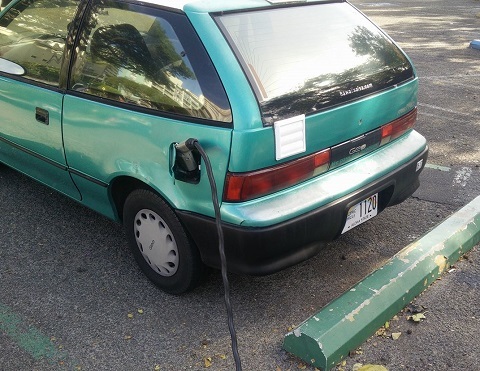Electric car FAQs, part two

Electrifying transportation is a far better option than continued reliance on fossil fuels. (Credit: Lindsay Coulter)
My "Five electric car FAQs" blog asked "What else would you like to know about EVs?"
Steve Kux, David Suzuki Foundation renewable energy and climate solutions policy analyst, answers your questions:
Is an EV's electricity use environmentally destructive?
It depends how your electricity is produced. Burning coal or natural gas releases carbon emissions and contributes to climate change. In November 2016, the federal government announced new regulations to phase out coal power by 2030. Ontario -- the biggest electricity consumer -- phased out coal power in 2014. Much of Canadian electricity comes from hydroelectric power. So in Canada, EVs are better for the climate than vehicles that burn fossil fuels.
Won't EVs increase demand for electricity?
Yes. We need to produce more electricity from non-emitting sources to meet future needs without worsening climate change. Electrifying transportation is a far better option than continued reliance on fossil fuels. EVs are three times more efficient at turning stored energy into motion than conventional vehicles and so also waste less energy. Wind and solar are cheaper alternatives with fewer long-term issues than nuclear power.
Are EV batteries eco-friendly?
As with most industries that extract resources, battery manufacture and disposal raise environmental concerns. A transition to low- and zero-carbon transportation methods will need to protect workers' rights, prevent negative local environmental impacts and reduce waste. For example, used EV batteries (no longer keeping a full charge) can be a useful source of back-up power for off-grid homes.
Is lithium mining environmentally safe?
Mining lithium can have negative environmental consequences. We need to push for ethical mining practices and reduce the industry's impact. (Lindsay: Maybe Fair Trade certified EV's are the future?)
Are EV batteries expensive to replace?
In Canada, the average conventional car costs $1,500/year in gas. Manufacturers of EV batteries guarantee a lifespan of eight to 10 years. Replacement costs vary depending on size -- $5,000 to $8,000.
Do air conditioning and heating affect EV range?
Yes. When energy to heat and cool comes from the same battery, these functions reduce range. Some models include a separate battery. Battery range estimates try to include real-world conditions and often provide battery performance ranges.
Do EVs include more eco-friendly materials?
Depends on the manufacturer and model. For example, you can have bamboo dashboard panels instead of plastic in a BMW i3.
What changes are you making to your transportation challenges?
Sincerely,
Lindsay Coulter, a fellow Queen of Green
Hey! Want more DSF? Join David Suzuki on Facebook

David Suzuki's Blog
- David Suzuki's profile
- 247 followers



